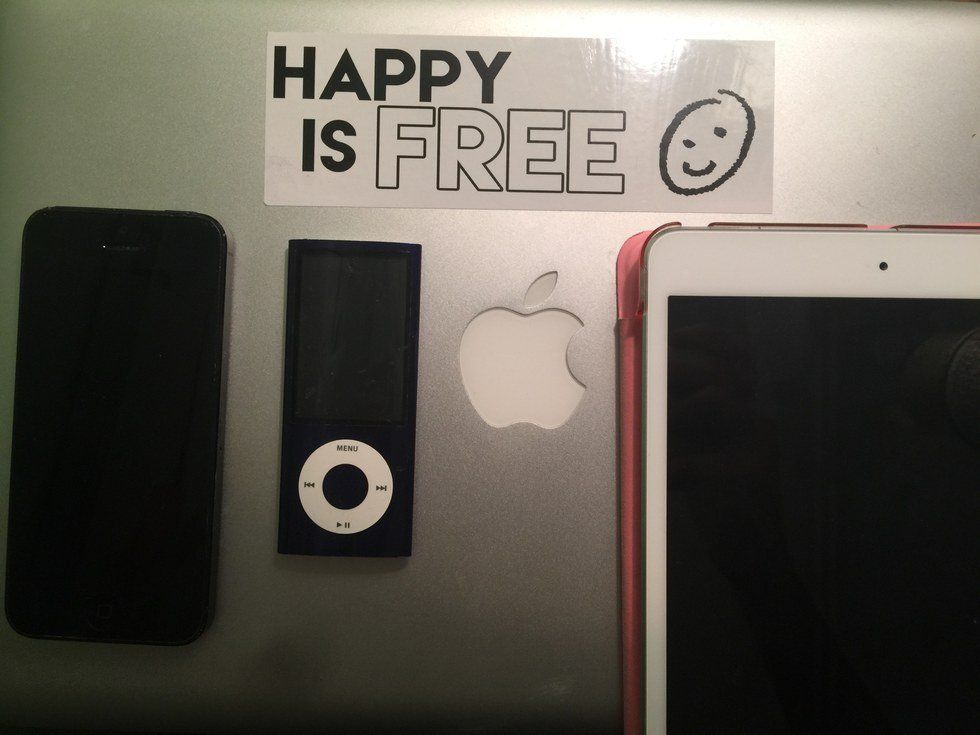I was born in 1995, and almost of my childhood memories are from the early 2000s. I never really experienced a childhood without technology, and for this reason, this article may be incredibly biased. Even when I was in kindergarten and going to a daycare program before school, my friends and I had the option of spending our time using "Kid Pix" (note: the greatest computer program of all time). And, believe it or not, I do not think that growing up around technology has ruined my life and damaged me beyond repair.
In 2014, I was watching a two-year-old at a family party. She asked me if she could play with my phone and I was a little surprised that she knew how to unlock it and open apps. Given her age, I found this interesting, but certainly not disastrous. It was a sign of changing times. It’s time to stop technology shaming, and to charge into the future.
I was not alive a century ago, but I can imagine that not everyone was thrilled about the invention and eventual mass production of cars. There were probably people who thought that horses were the right way – and should be the only way – to travel. Cars were dangerous, and because they were new, this probably seemed to overshadow all of their positive qualities. I doubt that the people who criticize technology as an enemy to society would opt to forego their cars in favor of getting around on horseback.
That’s not what this article is about. I’m not going to criticize other people’s arguments and spend an entire page wrapped in some hypothetical situation. Instead, I’ll look at the reasons why technology is not only not harmful, but beneficial to our society.
The internet and the availability of wireless networks have made communication easier and more readily available than past generations would have ever imagined. I live on the east coast, and my brother spent about five years living in Oregon. Face-to-face communication is tough to manage when you are literally separated by an entire continent. Because of the capabilities that even a basic laptop now has, my entire family could see him and talk to him in real time with just a few clicks of a mouse.
Even for those who are within a reasonable proximity to their loved ones, communicating online or via text can provide an anxiety-buffering solution to holding a conversation. For a variety of reasons, some people do not like face-to-face conversation. They may become uncomfortable even when talking over Skype, because the other person can still see them and read their body language. For people who find conversations hard, text messaging and email can be life-savers. Personally, I am not a fan of making phone calls. Whether it’s for a doctor’s appointment, work, or simply asking a family member a question, I prefer to avoid calling people if at all possible. Whenever I can, I text or email people with any questions or comments that I have. It’s not that I’m incapable of making a phone call; I just prefer to type my thoughts out because it allows me to streamline them.
One of the most valuable things I’ve learned from exposure to technology is how to properly multitask. I almost always have at least three windows open on Google Chrome, and a few different programs open as well. I find myself able to have a conversation with someone who’s standing next to me while typing (like I’m doing right now, because my mom’s sitting right across from me), or to bounce around among programs without becoming totally lost. Am I saying that I can accomplish everything that I need to do at one time without missing a beat? Absolutely not. But I can work on more than one project at once without crumbling from being overwhelmed.
The reason that technology lends itself to multitasking is that it’s not intrusive. If all communication were to be carried out in person, then we would all always need to focus our attention on the person we’re talking to. If we fail to do this, we seem rude and inattentive. Additionally, you have to set aside a block of time to meet with someone. It’s likely that not every moment of this time will be used productively. If you communicate via email, for example, only the necessary content will be covered. Or, at the very least, you’ll be able to waste less time with the things that don’t matter.
Ultimately, this feeds into what I consider one of millennials’ greatest strong points: our ability to multitask. We can divide our attention among a tablet, a laptop, a smart phone, and the person sitting across the room from us fairly easily. Personally, I feel that the quality of my work benefits from this, because I don’t feel pressured to focus all of my attention on one idea or project. Often the different things I’m working on inspire one another, so it makes sense to work on more than one at the same time.
Like I said before, I’m totally biased. I love my iPhone. I love Tumblr, Instagram, Twitter, Runkeeper, Spotify, and all of the other websites and apps I use daily. I’m not saying that technology should be used constantly or that it makes everything easier. There are some tasks that are better accomplished through a face-to-face meeting. Sometimes, simplicity is favorable to modernity. But technology should be embraced and looked at as a valid means of communication, rather than being shunned as a millennial trend.





















